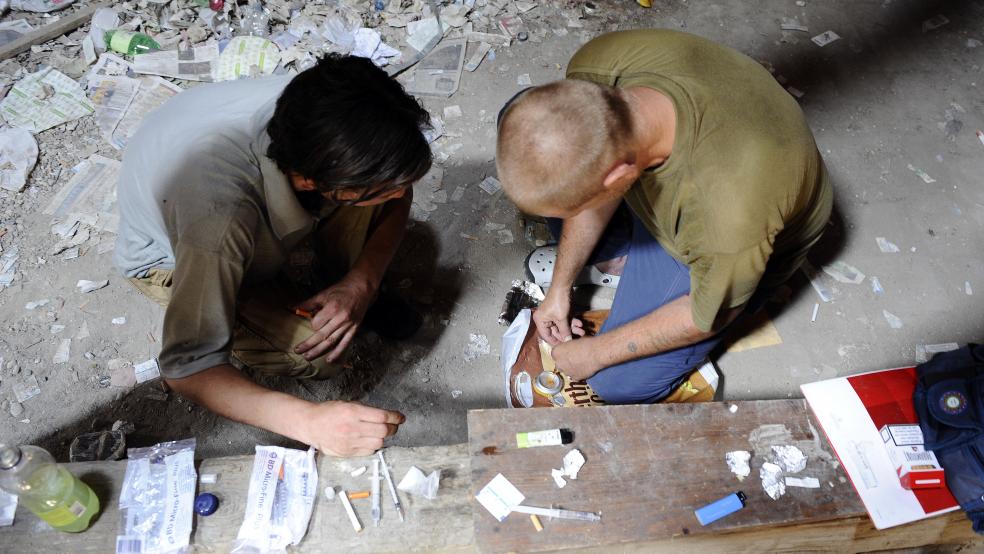President Trump campaigned last year vowing to address the nation’s tragic epidemic of opiate addiction and overdoses and then brought it up again a week ago during his address to a joint session of Congress.
“We will stop the drugs from pouring into our country and poisoning our youth, and we will expand treatment for those who have become so badly addicted,” Trump said.
Related: A Military Buildup and Big Tax Cuts: Is the Debt Set to Soar Under Trump?
The crisis is unmistakable: A record 33,000 people died of opioid overdoses in 2015, according to the Centers for Disease Control and Prevention, and addiction to heroin and other powerful drugs is rampant. Once the scourge of inner cities and urban areas, drug addiction has now become a brutal fact of life in suburban and rural areas as well, including in New Hampshire, Kentucky, Ohio and West Virginia.
And yet, last week House Republicans and the Trump Administration unveiled austerity measures that when taken together would do incalculable harm to federal programs that assist drug addicts and the mentally ill.
The first was a House Republican proposal to strip out essential mental health and drug addiction treatment in the coming years as part of the GOP’s highly controversial replacement plan for the Affordable Care Act. An estimated 1.3 million people currently receive treatment for mental health problems and substance abuse under an expanded Medicaid program in 31 states and the District of Columbia.
The Washington Post reported last week that the Republican’s American Health Care Act would freeze and then roll back expanded Medicaid beginning in 2020, which means that many of those patients would be denied desperately needed treatment in the future. Moreover, if the Republicans prevail in overhauling the traditional Medicaid program converting it to a system of fixed, per-capita payments to the states, a far greater number of Americans could lose their mental health and drug treatment assistance in the coming years.
Related: A Plan to Drastically Cut EPA Staff and Programs Is on Trump’s Desk
Medicaid pays on average nearly 50 percent of medication assisted treatment in three states with some of the biggest drug addiction problems, including Ohio, Kentucky and West Virginia, according to figures compiled by the National Center on Behavioral Health. In 2014, spending by Medicaid accounted for 25 percent of all mental health spending in the U.S. and 21 percent of all substance use disorder expenditures.
Joshua Sharfstein, an associate dean at the Johns Hopkins Medical School, told The Washington Post that, taken as a whole the Republican plan to replace Obamacare “is a major retreat from the effort to save lives in the opiate epidemic.”
But the problem is even more serious than that. As part of its effort to offset the cost of a major military and homeland security buildup, the Trump administration has targeted the Department of Housing and Urban Development for $7.7 billion in fiscal 2018 – a 16 percent reduction in the agency’s current $48.2 billion operating budget.
The Center on Budget and Policy Priorities estimates that those cuts if approved by Congress, would contribute to the loss of about 200,000 rental assistance units across the country. Funding for federal housing vouchers would plummet by about $900 million while rising housing costs and inflation would exacerbate the problem.
Related: Prospects Dim for Deficit Control as Trump Drives for Defense Buildup
At the same time, public housing funding for 2.1 million residents – many of them seniors or people with disabilities – would also take a hit under the budget reduction plan crafted by the Office of Management and Budget. “Reducing the availability of this crucial support would increase and prolong homelessness for vulnerable people with disabilities, families with children and others,” wrote Douglas Rice, a housing expert and a senior policy analyst at the CBPP.
Mental health and drug addiction experts have long contended that drug addicts who have decent, safe and affordable housing respond far better to treatment than people who are homeless or living in squalor.
“Poor housing, such as housing that’s too expensive, run-down or over-crowded, can lead to poor overall health,” according to an analysis by BC Partners for Mental Health and Addiction Information, a group of seven leading health and addiction non-profit agencies. “It can also make recovery from mental health or substance problems much more difficult.”
In an interview Friday, Rice of the CBPP said that a staggering number of homeless people living on the street have significant mental health issues or substance abuse problems that are difficult to treat without them having a more stable environment.
Related: Will CBO Deal a Death Blow to the GOP Health Care Plan?
“There’s a lot of evidence showing that providing these folks with stable, affordable housing can be an important first step to securing treatment for the other issues that they face,” he said. “There’s what’s called ‘supportive housing’ which combines affordable housing with treatment and other services that these guys benefit from.”





